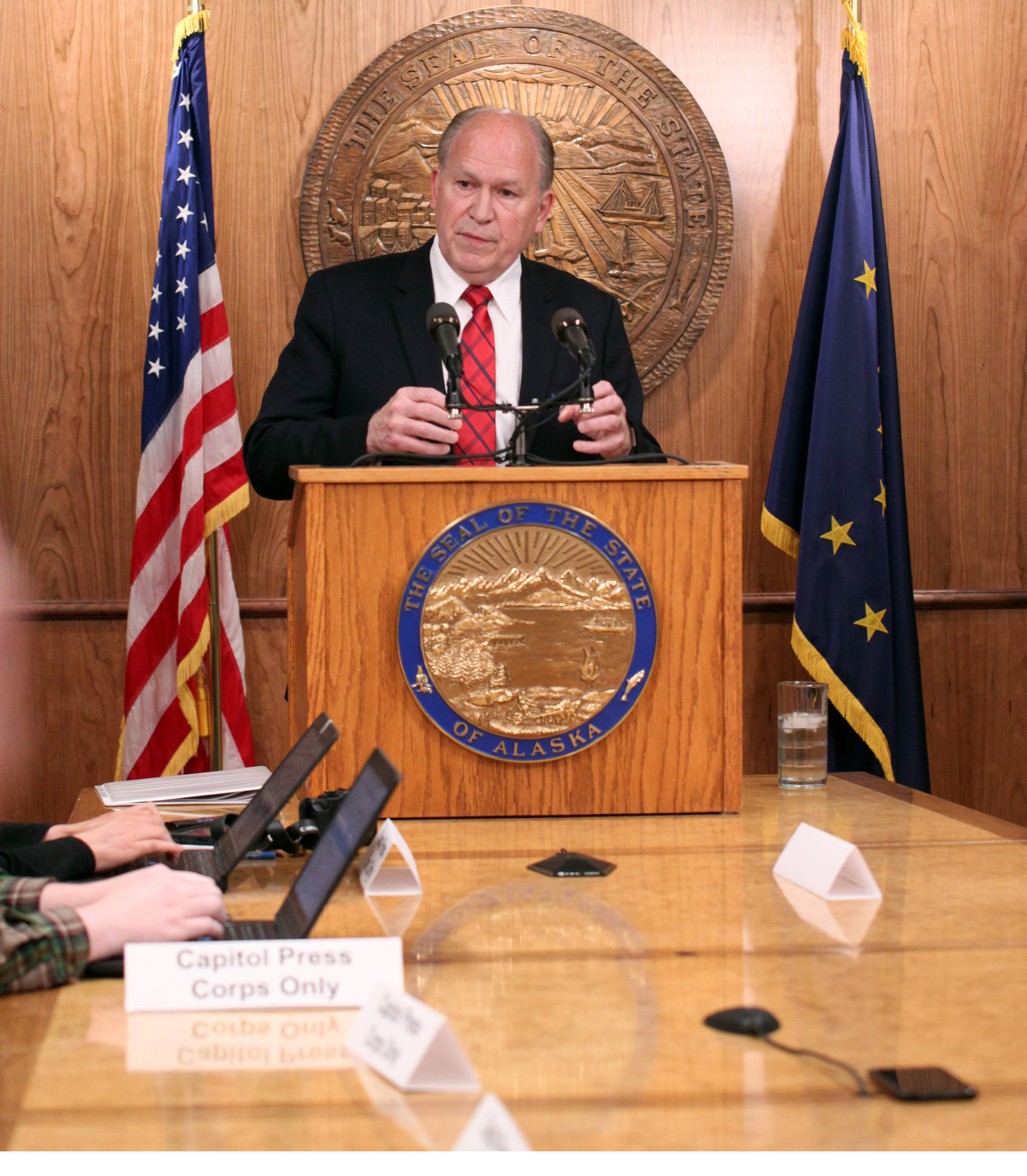A day after the Alaska House Majority rejected his compromise bid to avert a statewide government shutdown, Gov. Bill Walker said he still hopes that shutdown can be averted.
“My message to legislators: If you can’t find further compromise in what I have presented, please, please develop your own compromise,” he said during a Tuesday press conference with the Capitol press corps.
Wednesday is the 21st day of a 30-day special session called by Walker to give the Legislature time to avert a statewide shutdown by agreeing upon a budget and a way to pay for that budget.
The state’s fiscal year starts July 1. If lawmakers can’t reach a deal before that date, state services will all but end on Monday, July 3.
Some state agencies, including the Alaska Marine Highway, may see the shutdown’s effects before July 1.
The Legislature’s inability to reach a compromise is being caused by a divide between the Alaska Senate Majority (principally Republican) and the Alaska House Majority (principally Democratic).
The House Majority has proposed a four-part fiscal plan that erases the state’s $2.7 billion annual deficit within three years. The Senate Majority has proposed an alternative that does not fully close the deficit but avoids significant new taxes.
With a shutdown looming, Walker proposed a compromise that included elements of each majority’s proposal. Critically, however, Walker’s plan leaves a $300 million annual deficit.
House leaders rejected Walker’s idea because of that deficit.
“We’re still going to have a tremendous deficit,” Speaker of the House Bryce Edgmon, D-Dillingham, said Monday night. “We’re still going to be draining significantly from dwindling savings accounts, and I’ll tell you what: If the Trump budget cuts become reality, factored by whatever inaction that the Legislature might be involved in this year … Alaska could be in for a tremendous double-whammy going forward.”
Senate President Pete Kelly, R-Fairbanks, did not reject Walker’s proposal as did the House.
“The governor’s proposal was well-received. That doesn’t mean we’re going to agree to everything he had in it,” Kelly said.
He said at least some of the House’s rejection could be a negotiating tactic.
“I don’t know how much of that is posturing,” he said.
He added that he views the governor’s intervention in the situation as a positive sign.
“If you’re asking whether I’m more optimistic today than I was on Friday, the answer would be yes,” Kelly said.
Walker said that even if his compromise is rejected, lawmakers can reach a deal or take elements of his compromise into a new deal.
“The main thing is we continue to talk to each other. I think if we’re talking to each other, that’s progress. … Maybe somebody else will bring a different plan in, a different compromise in,” Walker said.
The House and Senate agree that using the earnings of the Alaska Permanent Fund will be the core of any deficit fix. They differ on the details of how the Permanent Fund will be used, and the House Majority has said that the Permanent Fund solution must be coupled with something else.
The most likely “something else” is House Bill 111, which cuts the state subsidy of oil and gas drilling. The House and Senate have approved different versions of that bill.
Rep. Geran Tarr, D-Anchorage, is chairwoman of the conference committee assigned to compromise the House and Senate versions of the bill into something amenable to both. She said Tuesday afternoon that the conference committee could meet Wednesday or Thursday, but Thursday is more likely.
On Tuesday afternoon, Kelly offered another option. He suggested that the Legislature could divorce the budget from discussions over a long-term deficit fix.
There is enough money in the state’s Constitutional Budget Reserve to fund government operations for one final year without dipping into the available accounts of the Permanent Fund.
Would Kelly be open to using that money to avert a shutdown?
“I would be, if that’s necessary,” he said. “Linking all of these other (deficit fixes) to the budget has not been fruitful.”
• Contact reporter James Brooks at james.k.brooks@juneauempire.com or call 419-7732.

